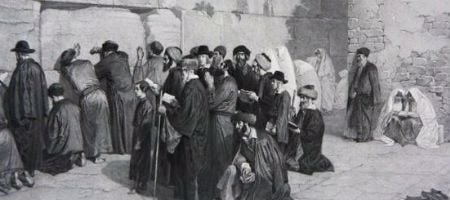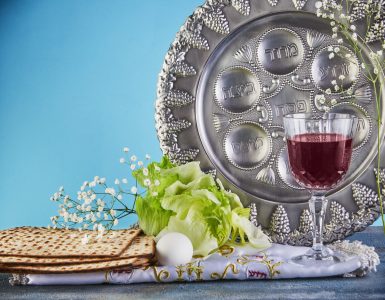Compared to the other fast days throughout the year (Tzom Gedalia, Asara b’Teves, Ta’anis Esther, and Shiva Asar b’Tamuz), Tisha b’Av is more stringent in three main ways:
- Tisha b’Av begins at nightfall, while all other fasts begin at Alos haShachar.
- Pregnant and nursing women are obligated to fast on Tisha b’Av but not on the other fast days. (See Pesachim 54b).
- In addition to eating and drinking, on Tisha b’Av it is also forbidden to wash one’s body, apply ointments or creams, wear leather shoes, or engage in marital relations, just like on Yom Kippur.
The Gemara implies (ibid.) that the obligation of Inuy (affliction) on Tisha b’Av is like that of Yom Kippur. This leads the Poskim to discuss the Halacha of a Choleh she’Ein Bo Sakana on Tisha b’Av: must he eat only “Pachus mik’Shiur” (small aliquots less than the forbidden Shiur)as he must on Yom Kippur?
On the one hand, the Shulchan Aruch states (O.C. 554:6):
[Regarding] a Chaya (a woman who recently gave birth) for all thirty days [following the birth], and, likewise, a Choleh who needs to eat: They do not need an assessment, rather we feed them immediately, for in a case of illness the Rabbis did not institute [the obligation to fast].[1]
When it comes to Yom Kippur, we rule that an assessment is required to determine whether fasting poses a risk to a Choleh’s life, and only then may he be permitted to eat (Shulchan Aruch, O.C. 618). On Tisha b’Av, no assessment is required because even a Choleh she’Ein Bo Sakana is not required to fast, as the Mishna Berura explains (ibid. 11, 12):
A Choleh – meaning that he is weak and his whole body feels [ill] – we allow him to eatthough there is no danger to his life.
Does not need an assessment – this refers to both cases [a Chaya and a Choleh]… the intent is that an assessment and estimation as to whether fasting will be a Sakana is unnecessary. For even if there is no Sakana, since they are Cholim she’Ein Bahem Sakana they do not need to fast.
The Shulchan Aruch’s expression – “for in a case of illness the Rabbis did not institute [the fast]” implies that when the Nevi’im established the fast of Tisha b’Av, it never applied to Cholim. This would mean that a patient should be allowed to eat as much as he pleases. However, the Biur Halacha states otherwise:
See the Sefer Pischei Olam, [who states] that in a place where there the cholera epidemic does not have a Chazaka, he should eat less than a Koseves in Kedei Achilas Pras. Likewise concerning drinking, in accordance with the Shiurim in Shulchan Aruch 618. (This is how it is appropriate to rule to one who enquires about Tisha b’Av, for in this way the Ta’anis will not be uprooted completely – the Torah wants the heart.)
In other words, a Choleh she’Ein Bo Sakana should eat on Tisha b’Av as he would on Yom Kippur, namely, less than a Shiur in volume (Pachus mik’Koseves) and in time (less than Kedei Achilas Pras). This is a great Chiddush; we will see how the Poskim related to this matter.
First, the source for using the Shiur of a Koseves for Tisha b’Av is unclear. Rav Shlomo Zalman Auerbach zt”l (Halichos Shlomo, Ta’aniyos 13) explains that the Shiur of Koseves applies to all the fast days for if the Shiur would be a Kezayis (as with all other Isurim), it would mean that the other fasts would be stricter than Yom Kippur. This would surely be untenable given that Yom Kippur is a d’Oraisa and Isur Kares and the other fasts are only Takanas Nevi’im.
However, the Shulchan Aruch rules (O.C. 568:1) that if a person accepts a fast upon himself but eats a Kezayis, he has broken (and canceled) his fast. This implies that the Shiur for other fast days is a Kezayis, not a Koseves. The Sdei Chemed (4, Ma’areches Bein haMetzarim, 2:15) cites Acharonim who assert that the Shulchan Aruch only refers to a Ta’anis Yachid, not to a Ta’anis Tzibur for which the Shiur is a Koseves. However, the Prisha (beginning of Siman 568) cites the Terumas haDeshen (156) who discusses at length the case of “a person who forgot and ate more than a Kezayis on Shiva Asar b’Tamuz”, clearly implying that a Kezayis is the Shiur for a Ta’anis Tzibur as well. See also the Shevet haLevi (4:56 & 8:128) who discusses this question.
The main Chiddush of the Biur Halacha is that a Choleh she’Ein Bo Sakana cannot eat in a regular fashion on Tisha b’Av but he must eat Shiurim. By contrast, the Aruch haShulchan (ibid. 7) rules that “less than a Shiur is not relevant to Tisha b’Av which is d’Rabbanan”.
The question would seem to depend on the following: If Chaza”l instituted that Tisha b’Av applies to everyone, but then gave an allowance for a Choleh to eat, it would certainly seem appropriate for him to only eat Shiurim for doing so will mean he does not lose his fast, as evident from the Mishna Berura (568). Why should he eat more than the minimum necessary? On the other hand, if, as the Shulchan Aruch implies, Chaza”l never established Tisha b’Av for Cholim, it should be permissible for him to eat as he pleases.
Rav Shlomo Zalman distinguished between two cases (Halichos Shlomo, Nissan 13:5):
- A healthy person who needs to eat because fasting will cause him to become ill should eat Shiurim.
- A Choleh she’Ein Bo Sakana may eat without limitation.
This distinction was extremely relevant during cholera epidemics, referenced by the Mishna Berura above. During cholera outbreaks, Poskim would instruct their communities not to fast in case they had been infected [but were not yet symptomatic] and would be putting themselves at risk by fasting. Since the people were healthy at the time (as far as they knew), they were instructed to eat Shiurim and not eat freely.[2]
Why would Chaza”l have exempted a Choleh completely from the fast? Would it not make more sense to expect him to fast as much as possible and only eat Shiurim? Rav Shlomo Zalman elaborates:
The Chachamim did not want to obligate him to experience this discomfort all day. Therefore, they did not institute the fast for [Cholim]. However, in our case (of a healthy person who wants to avoid becoming ill), it is logical that with all the fasts it is correct for him to eat less than a Shiur with a Hefsek of Kedei Achilas Pras.
It is, however, difficult to maintain that this is the position of the Biur Halacha. As quoted above, he cites the Pischei Olam regarding the cholera epidemic and then concludes by stating:
This is how one should rule to one who enquires about Tisha b’Av, for in this way the Ta’anis will not be uprooted completely – “Rachmana Liba Ba’i” (the Torah desires the heart).
This implies that the Biur Halacha intended to expand the ruling of the Pischei Olam: Not only should a healthy person during an epidemic eat Shiurim, but so should a Choleh she’Ein Bo Sakana.
Rav Shmuel Wosner zt”l (Shevet haLevi 9:131) discusses an elderly person or pregnant woman who feels well and strong and whether they should fast since it would weaken them to the extent that they would be exempt from fasting as Cholim sheYesh Bahem Sakana. Perhaps they should begin eating Shiurim from the beginning of the fast so that they wouldn’t end up losing the fast entirely if they reach the point that they must eat normally?
Rav Wosner begins with the contention that a person in this situation should certainly not break his fast – even to eat a Chatzi Shiur – while he is feeling well just to prevent potential problems later in the day. He notes that the Biur Halacha’s ruling that one should eat Shiurim on Tisha b’Av is unclear, as there should not be a Din of Chatzi Shiur on, “as is the assumed position of all the Poskim”. No proof can be drawn from the Pischei Olam as he was discussing healthy people who wanted to avoid becoming ill (as explained by Rav Shlomo Zalman above). Rav Wosner adds:
That which the Biur Halacha states that this is what one should advise a person on Tisha b’Av if he asks whether he may eat – this is not me’Ikar haDin, it is only a good practice if it is possible to avoid uprooting the Ta’anis completely.
In another Teshuva, Rav Wosner explains further (4:56):
In my humble opinion, [the Pischei Olam] only wrote this in a case of [cholera] which, as is well known, would have meant that the entire Ta’anis would have been entirely uprooted by permitting the entire community to eat on Tisha b’Av. If so, given that uprooting a Ta’anis is a grave matter, he advised to eat in a little over Kedei Achilas Pras so that there would be a Heker for the Ta’anis so that Tisha b’Av would not be completely forgotten. Also, [in that case] they were not yet Cholim at all – the advice to eat was only because refraining from eating could cause the disease to spread. In that case, it was certainly logical to be stringent, as stated. This is not the case when a person has already contracted an illness – even if it does not pose a Sakana – for in a case of a Choleh the Chachamim did not make their Takana.
This is also the position of haGaon Rav Asher Weiss Shlit”a (Minchas Asher, Ta’aniyos 38):
It seems obvious that this was not said as a Psak Halacha but as a worthy practice, to fulfill the Mitzva of the Chachamim. This is correct to rule Lechatchila, for in this way the Ta’anis is not completely uprooted. Although me’Ikar haDin it is permissible for this person not to fast, nevertheless, “the Torah wants the heart”, and one who has Yiras Shamayim should be careful not to eat anything more than an amount smaller than a Shiur. So it appears clear and obvious to me from his (the Biur Halacha’s) expression, “It is appropriate to rule”, in other words, this is not the Ikar haDin but Latzeis Yedei Shamayim. For this reason, he concludes with the words, “the Torah wants the heart”. In fact, he only wrote it as an endnote, in parentheses.
Some want to adduce proof from the well-known comments of the Chasam Sofer (O.C. 157) regarding an Aliya on Tisha b’Av for a Choleh who has eaten (see Shulchan Aruch O.C. 566:6). The Chasam Sofer offers three reasons to permit it, the third of which is that even the Maharik (who has a stringent opinion and does not permit someone who is not fasting to receive an Aliya) only referred to Ta’anis Behab, which is not a fixed Ta’anis Tzibbur. Since the days of Behab are regular weekdays for those who are not fasting, they may not receive an Aliya. However, Tisha b’Av is the day of Churban haBayis, and even for a Choleh who has eaten it is a Ta’anis. The Choleh is, moreover, obligated to observe the other Inuyim. He may, therefore, receive an Aliya. The Chasam Sofer then adds that even concerning eating, the Choleh should still refrain as much as possible. He may only eat as much as he needs to, then he should return to fasting.
Some say that the Chasam Sofer’s latter comment implies that a Choleh should eat less than a Shiur, if possible. There is certainly some merit to this argument. Since the Chasam Sofer holds that a Choleh should only eat as much as he needs and then return to fasting, it stands to reason that he should not eat more than a Shiur if less would suffice.
However, Rav Wosner argues (and Rav Asher also implies as such in Minchas Asher) that there is a difference between the cases. Logically, Chaza”l would not have obligated a Choleh who needs to eat a significant amount to divide up his meal throughout the day to eat less than a Shiur. However, they would obligate him to return to fasting once he has eaten a sufficient amount.
In conclusion: A Choleh she’Ein Bo Sakana is not excluded entirely from the Ta’anis. This is why it is Midas Chasidus and good practice to eat Shiurim if possible. In the words of the Biur Halacha, “Rachmana Liba Ba’i”.
[1] The Rema adds: “However, they are accustomed to fast all the while that it does not greatly distress them which would be a concern of risk to their lives. One who is lenient has not lost out.”
[2] As it happens, in the Brisker tradition this ruling applies even to Yom Kippur. However, this is not widely accepted.















Add comment